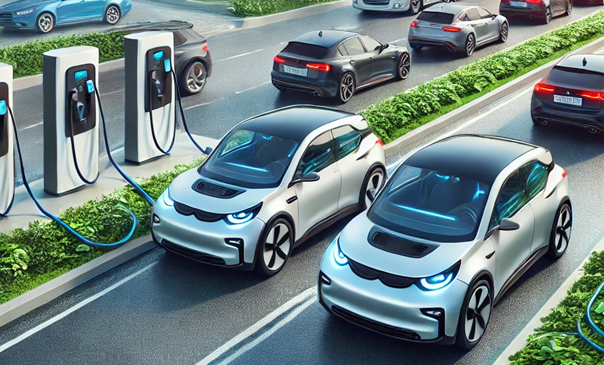Electric Cars vs. Combustion Cars: What is the Future of Mobility?
In recent years, the discussion about the future of mobility has intensified, especially with the rise of electric cars. However, combustion vehicles still dominate the streets and the automotive market.
This raises the question: how long will this trend continue? In this article, we will compare electric cars and combustion cars, analyze their main features, and explore their environmental and economic impact.

Comparison Between Electric Cars and Combustion Vehicles
A comparison between electric cars and combustion vehicles reveals clear differences.
While combustion vehicles use fossil fuels, such as gasoline and diesel, electric cars rely on batteries that store electricity, a cleaner energy source.
Additionally, electric vehicles are more efficient, converting a higher percentage of energy into motion.
On the other hand, combustion vehicles lose much of that energy in the form of heat.
In terms of performance, electric vehicles offer instant torque, providing a smoother and quieter driving experience.
Combustion vehicles, by contrast, are noisier and have less linear acceleration. This distinction can impact driver preferences in different regions and types of use.
Sustainability in the Automotive Industry
Sustainability in the automotive sector has been a central topic in debates about the future of mobility.
With increasing awareness of climate change, many countries and automakers are seeking more sustainable solutions.
Electric cars, because they do not directly emit pollutants, provide an effective solution for reducing carbon emissions.
However, the production of lithium batteries, used in electric cars, also raises environmental concerns, as it involves the extraction of rare minerals and can cause ecological impacts.
Even so, the overall comparison shows that electric cars are significantly more sustainable over their lifetime.
Advantages of Electric Cars
The advantages of electric cars are numerous. Besides not emitting pollutants during use, they require less maintenance since they have fewer moving parts compared to combustion vehicles.
Items such as oil changes and engine maintenance are eliminated, resulting in reduced operational costs over time.
Another significant advantage is energy efficiency.
Electric cars convert a higher percentage of the energy they consume into movement, while combustion engines waste part of this energy as heat.
This directly contributes to the vehicle’s sustainability.
Disadvantages of Combustion Vehicles
On the other hand, the disadvantages of combustion cars are becoming increasingly apparent. In addition to the negative impact of carbon emissions, which contribute to global warming, combustion vehicles depend on fossil fuels, a finite resource.
Rising fuel prices and the geopolitical instability surrounding oil production make these vehicles less attractive in the long term.
Energy Efficiency and Sustainability
The energy efficiency of electric cars is one of the main reasons they are gaining market share.
While combustion vehicles convert only about 20-30% of fuel energy into motion, electric cars can convert up to 80-90% of battery energy into motion.
This difference not only makes electric cars more efficient but also reduces global energy consumption.
Carbon Emissions: The Impact of Combustion Vehicles
Carbon emissions are one of the biggest problems with combustion vehicles.
Each liter of gasoline burned emits approximately 2.3 kg of carbon dioxide into the atmosphere.
With billions of combustion vehicles in operation, the pollution generated has a significant impact on the global climate.
On the other hand, electric vehicles can be powered by renewable energy sources, reducing dependence on fossil fuels and minimizing total emissions.
Cost-Benefit of Electric Cars
Although electric cars are still more expensive to purchase, their cost-benefit over time compensates for this initial difference.
With government incentives, such as tax discounts and fee exemptions, and much lower fuel costs (electricity is cheaper than gasoline or diesel), electric vehicles have growing financial appeal.
Electric Car Range
The range of electric vehicles is one of the main concerns for consumers, especially for those who need to travel long distances.
However, with recent automotive innovations, this limitation is being overcome. Newer models can reach 400 to 500 km on a single charge, making electric vehicles increasingly competitive.
Charging Infrastructure
The expansion of charging infrastructure is a crucial factor for the mass adoption of electric cars.
The growth of charging points in urban centers and highways is making it easier to use these vehicles, eliminating the concern of running out of energy during long trips.
Automotive Innovations in the Electric Sector
Automotive technology is constantly evolving. Recent automotive innovations in the electric sector include the development of more durable batteries and the implementation of ultra-fast charging.
Additionally, many manufacturers are exploring the integration of solar panels and energy recovery systems, which will further enhance the efficiency and range of electric vehicles.
Tesla’s Role in the Electric Cars Revolution
When discussing the future of mobility, Tesla is a name that cannot be overlooked. As a pioneer in the electric vehicle market, Tesla has played a crucial role in driving the development and adoption of electric cars worldwide.
Known for its cutting-edge automotive technology, the company has set benchmarks for electric vehicle efficiency, autonomy, and innovation.
With models offering impressive range and access to an expansive charging infrastructure, Tesla has made significant contributions to the shift away from combustion vehicles.
Additionally, their focus on sustainability and clean energy solutions continues to influence the entire automotive sector.
Conclusion: What is the Future of Mobility?
The future of mobility is clearly moving towards electric cars. With constant automotive innovations and growing sustainability in the automotive sector, it is likely that combustion vehicles will become a technology of the past.
Energy efficiency and the reduction of carbon emissions will be the main driving forces behind this transformation.